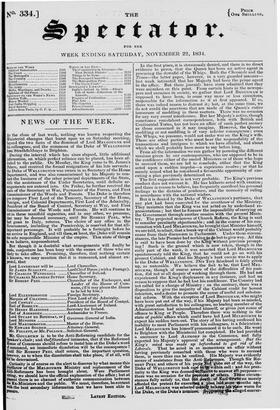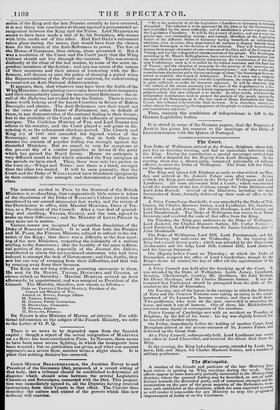from Stmthfieldsaye to Brighton. which we shall probably have more
to say before long.
information, on which perfect reliance can be placed, has been af- Department, and was also commissioned by his Majesty to con- duct the business of the other principal departments of the State, toting a plan previously determined on.
en arrive in England, and till then, at least, the Duke will remain Lord STUART DE ROTHSAY, or}
Procure. Lord MELBOURNE was selectedsmigelt tolkeop his place warm for NITS OF THE WEEK TOPICS OF THE DAY- In the first place, it is strenuously denied, and there is no direct
Political Summaries 1101 The Constitution in Abeyance: the evidence to prove, that the Queen has been an active agent in
The Metropolis 1102 Things to be Done procuring the downfal of the Whigs. Both the Chronicle and the The Country 1106 The Dowager Chancellor 1114 Times—the latter paper, however, in a very guarded manner—
Island 1103 The Metropolitan Press 1114 last week intimated that her Majesty had been the prime agent in the affair. But these journals have since admitted that they
Births. Marriages, and Deaths.... 1110 Inglis's Ireland 111 1834-Allan's were mistaken on this point. From certain hints in the newspa-
Opinions of the Press 1110 Life of Scott—Literature of thu pers and surmises in societ, wegather that Lord BROUGHAM is va
Election Talk 1111 Progress of Publication 1120 supposed to have been, in some way more or less circuitous,
Roney Market 1111 Fine Arts 1120 responsible for the information as it at first appeared. If so,
Royal Society 1112 Prices Current 1122 there was indeed reason to distrust it; but, at the same time, we Letters from Paris, by 0. P. Q. ... 1112 Advertisements 1122-1124 do not credit the assertions that are made of the Queens entire innocence of meddling in these matters. There was no occasion for any very recent interference. But her Majesty's active, though NEWS OF T II E WEEK. sometimes roundabout correspondence, both with British and Continental Tories, has not been an affitir of such perfect secrecy as those concerned in it may imagine. However, the Queen's As the close of last week, nothing was known respecting the meddling or not meddling is of very inferior consequence : even Ministerial changes that burst upon us on Saturday morning, the Whigs, we presume, would not make war on the King's wife. There are otherparties w beyond the two facts of the dismissal of Lord MELBOURNE and paho must bear the responsibility of the his colleagues, and the summons of the Duke of WELLINGTON transactions and intrigues to which we have alluded, and about
During the interval which has since elapsed, little additional From all the information we can gather by perusing the different supposed to be is versions given by our contemporaries, who are forded to the public. On Monday, the King came to St. James's the confidence either of the ousted Ministers or of those who hope Palace, and received the formal resignations of his late servants : to succeed them, we are led to conclude, either that the King upon a sudden impulse—a capricious resolve ; or that he the Duke of WELLINGTON was sworn in as Secretary of the Home merely seized what he considered a favourable opportunity of exe- with the assistance of the Under Secretaries, until definite ar- The first supposition is not very probable. The King's previous conduct does not warrant it. He has hitherto acted with caution; tangements are entered into. On Friday, he further received the
seals of the Secretary at War, Paymaster of the Forces, and First and there is reason to believe, has frequently sacrificed his personal Commissioner of the Woods and Forests. The Duke is therefore feelings to the dictates of prudence, and the necessity of ruling pro tempore First Lord of the Treasury, Secretary of the Home, in accordance with the national wishes.
Foreign, and Colonial Departments, First Lord of the Admiralty, But it is denied by the Duke of WELLINGTON'S partisans, that President of the Board of Control, Secretary at War, and First any plot had been concerted for the overthrow of the Ministry. Commissioner of the Woods and Forests. He will continue to They maintain that the King was not acted on by underhand re- actin these manifold capacities, and in any other, we presume, presentations ; but that be foresaw the impossibility of carrying on that may be deemed necessary, until Sir ROBERT PEEL, who the Government through another session with the present Minis- had gone to Italy, returns. The choice of any office in the try. The projected measures of Church Reform, the King is said to consider peculiarly objectionable; and .ju the course of his con- Government, including the Premiership, is reserved for that all- versation with Lord MELBOURNE, he brought that Minister himself, important personage. It will probably be a fortnight before he we are told, to admit, that a break-up of the Cabinet would probably the sole responsible Minister of the empire. This state of things ensue from their discussion in Parliament. Under these circum- we believe, unprecedented. stances, the late Premier had nothin q,te 4o but to give way. All this is, is said to have been done by the is without previous prompt-
But though it is doubtful what arrangements will finally be ing ! Such is the ground which is now taken, though in the made, conjecture has been busy with the names of those who are early part of the week, it was asserted that Lord MELBOURNE likely to take office. Premising, therefore, that nothing certain spontaneously told the King, that he could not go on with his is known, we may mention that it is rumoured, and almost ex-
pected, that present Cabinet, and that his Majesty's best course was to apply
to the Duke of WELLINGTON. This Tory falsehood is fairly given
Lord LYNDHURST will be Lord Chancellor. up, as untenable. We believe the fact to be, that Lord MEL- Sir JAMES SCARLETT Lord Chief Baron (with a Peerage). BOURNE; though of course aware of the difficulties of his posi- Sir CHARLES WETHERELL Chancellor of Irelsnd. Con, did not at all despair of working through them. He had not SirCHARLES MANNERS SUTTON Home Secretary. Sir ROBERT PEEL Chancellor of the Exchequer, and experienced the King's displeasure in any instance, and had no Leader of the House of Corn- reason to suppose that he had lost his confidence. The Country had mons, (if it may please the House not called for a change of Ministry : on the contrary, there was a to be led by him.) disposition to give the majority of the Cabinet credit for honest Lord ELLENBOROUGH Foreign Secretary. intention, anda desire to promote the cause of useful and substan- Marquis of CHANDOS First Lord of the Admiralty. tial reform. With the exception of Lord BROUGHAM, who might Lord COWLEY President of the Board of Control. have been put out of the way, if his Majesty had been so minded, Earl of ROSSLYN Lord-Lieutenant of Ireland. with great satisfaction to his colleagues, no leading member of the Sir HENRY HARDINGE Secretary for Ireland. Administration had misconducted himself, or given just cause of Earl of ABERDEEN Ambassador to France. offence to King or People. Therefore there was nothing in the
Lord MUNSTER Governor-General of India. state of public affairs which could have led Lord MELBOURNE to
Lord MARYBOROUGH Master of the Horse. expect his'sudden turn-out. The story of his having confessed his Sir EDWARD SUGDEN Attorney-General. inability to meet Parliament with his colleagues, is a fabrication ; Mr. FOLLETT, or Mr. PoLLOCK Solicitor-General. Lord MELBOURNE has himself pronounced it to be such. He went secure of assistance from the Anti- 4rmors. Though Sir Ro-
the Duke, or the Duke's nominee, #upplearottP.a alleged conver- sation of the King and the late Premier actually to have occurred, it is any thing but conclusive evidence against a preconcerted ar- rangement between the King and the Tories. Lord MELBOURNE seems to have been made a tool of by his Sovereign, who comes with little credit out of this affair. Had Earl GREY'S retirement taken place during the recess, that would have been the chosen time for the return of the Anti-Reformers to power. The fear of the House of Commons, then sitting, alone prevented it. But it was a resolution of the Court and the Court party that the Whig Cabinet should not live through the vacation. This was avowed distinctly at the close of the last session, by some of the more im- prudent members of the faction ; and any one aware of the nature of their resources and their means of contesting with the Re- formers, will discern at once the policy of choosing a period when the Representatives of the People are scattered, for endeavouring to construct an Anti-National Administration.
It appears, then, that whatever may have been the faults of the WhigMinisters—how glaring soever may have been their incapacity and their unpopularity among the more earnest Reformers--the re- call of the Duke was not wished for by the Nation. There is no evi- dence worth looking at of the boasted reaction in favour of Rotten Boroughs and abuses. The Anti-Reformers owe their recall not to the votes of either House of Parliament, nor, in default of these, to any demonstration of the national feeling in their favour; but to the partiality of the Court and the influence of persevering intrigue. The Coalition Ministry of Fox and Lord NORTH was odious to the country, and the Court played a safe game in dis- missing it, as the subsequent elections proved. The Church and King cry of 1807 also seconded the bigoted wishes of the Sovereign; and no one can deny, that in both these in- stances the current of popular feeling ran strongly against the discarded Ministers. But we search in vain for symptoms at the present day of a similar prejudice in favour of the party which has gained the Royal favour. Hence we anticipate a very different result to that which attended the Tory intrigues at the periods we have cited. Then, there were only two parties in the country,—Whigs and Tories : now there is a third, stronger than the 'other two united. It will be seen presently, that the Court and the Duke of WELLINGTON have blundered egregiously in their estimate of the strength and determination of this latter class.





















